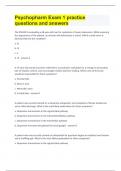Summary
Summary A-level Edexcel UK Politics 1 - Democracy and Participation key notes
- Module
- Paper 1 UK Politics (9PL0)
- Institution
- PEARSON (PEARSON)
Comprehensive A* politics notes for UK Democracy and Participation. Includes all key areas: direct and representative democracy, suffrage (votes at 16, compulsory voting), rights, and pluralism (pressure groups, think tanks, lobbying). Includes loads of recent examples.
[Show more]




